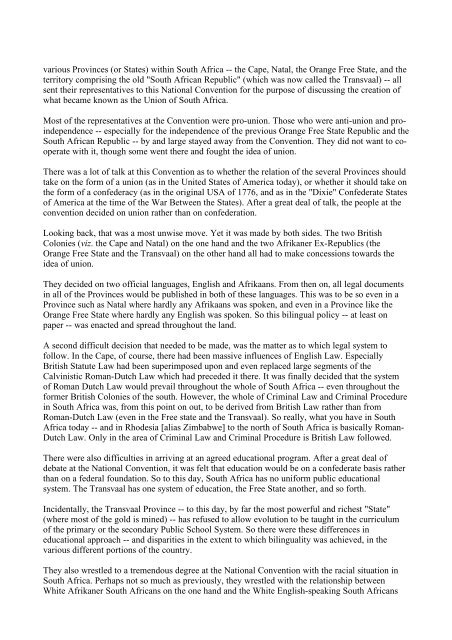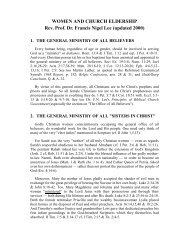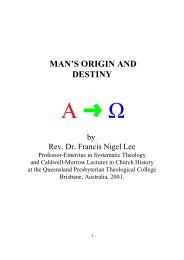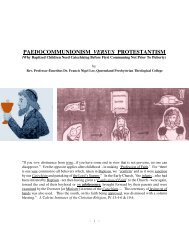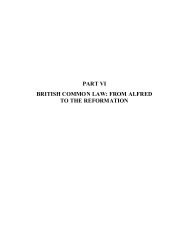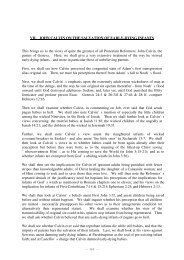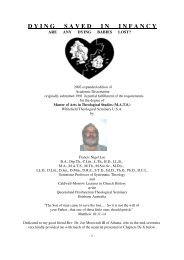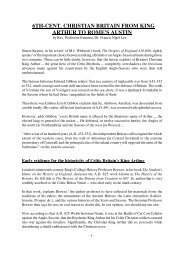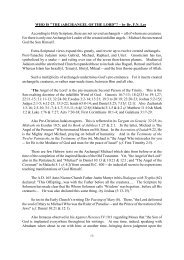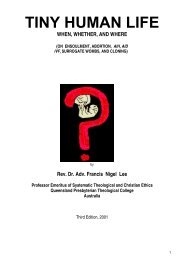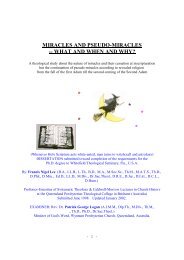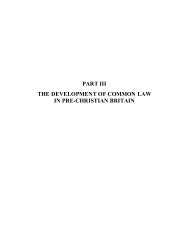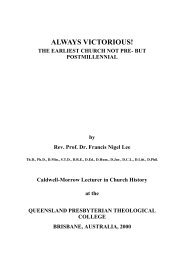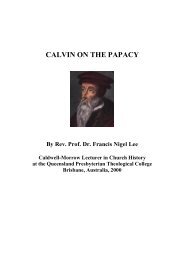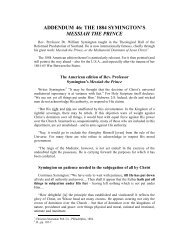THE CHRISTIAN AFRIKANERS - The Works of F. N. Lee
THE CHRISTIAN AFRIKANERS - The Works of F. N. Lee
THE CHRISTIAN AFRIKANERS - The Works of F. N. Lee
You also want an ePaper? Increase the reach of your titles
YUMPU automatically turns print PDFs into web optimized ePapers that Google loves.
various Provinces (or States) within South Africa -- the Cape, Natal, the Orange Free State, and theterritory comprising the old "South African Republic" (which was now called the Transvaal) -- allsent their representatives to this National Convention for the purpose <strong>of</strong> discussing the creation <strong>of</strong>what became known as the Union <strong>of</strong> South Africa.Most <strong>of</strong> the representatives at the Convention were pro-union. Those who were anti-union and proindependence-- especially for the independence <strong>of</strong> the previous Orange Free State Republic and theSouth African Republic -- by and large stayed away from the Convention. <strong>The</strong>y did not want to cooperatewith it, though some went there and fought the idea <strong>of</strong> union.<strong>The</strong>re was a lot <strong>of</strong> talk at this Convention as to whether the relation <strong>of</strong> the several Provinces shouldtake on the form <strong>of</strong> a union (as in the United States <strong>of</strong> America today), or whether it should take onthe form <strong>of</strong> a confederacy (as in the original USA <strong>of</strong> 1776, and as in the "Dixie" Confederate States<strong>of</strong> America at the time <strong>of</strong> the War Between the States). After a great deal <strong>of</strong> talk, the people at theconvention decided on union rather than on confederation.Looking back, that was a most unwise move. Yet it was made by both sides. <strong>The</strong> two BritishColonies (viz. the Cape and Natal) on the one hand and the two Afrikaner Ex-Republics (theOrange Free State and the Transvaal) on the other hand all had to make concessions towards theidea <strong>of</strong> union.<strong>The</strong>y decided on two <strong>of</strong>ficial languages, English and Afrikaans. From then on, all legal documentsin all <strong>of</strong> the Provinces would be published in both <strong>of</strong> these languages. This was to be so even in aProvince such as Natal where hardly any Afrikaans was spoken, and even in a Province like theOrange Free State where hardly any English was spoken. So this bilingual policy -- at least onpaper -- was enacted and spread throughout the land.A second difficult decision that needed to be made, was the matter as to which legal system t<strong>of</strong>ollow. In the Cape, <strong>of</strong> course, there had been massive influences <strong>of</strong> English Law. EspeciallyBritish Statute Law had been superimposed upon and even replaced large segments <strong>of</strong> theCalvinistic Roman-Dutch Law which had preceded it there. It was finally decided that the system<strong>of</strong> Roman Dutch Law would prevail throughout the whole <strong>of</strong> South Africa -- even throughout theformer British Colonies <strong>of</strong> the south. However, the whole <strong>of</strong> Criminal Law and Criminal Procedurein South Africa was, from this point on out, to be derived from British Law rather than fromRoman-Dutch Law (even in the Free state and the Transvaal). So really, what you have in SouthAfrica today -- and in Rhodesia [alias Zimbabwe] to the north <strong>of</strong> South Africa is basically Roman-Dutch Law. Only in the area <strong>of</strong> Criminal Law and Criminal Procedure is British Law followed.<strong>The</strong>re were also difficulties in arriving at an agreed educational program. After a great deal <strong>of</strong>debate at the National Convention, it was felt that education would be on a confederate basis ratherthan on a federal foundation. So to this day, South Africa has no uniform public educationalsystem. <strong>The</strong> Transvaal has one system <strong>of</strong> education, the Free State another, and so forth.Incidentally, the Transvaal Province -- to this day, by far the most powerful and richest "State"(where most <strong>of</strong> the gold is mined) -- has refused to allow evolution to be taught in the curriculum<strong>of</strong> the primary or the secondary Public School System. So there were these differences ineducational approach -- and disparities in the extent to which bilinguality was achieved, in thevarious different portions <strong>of</strong> the country.<strong>The</strong>y also wrestled to a tremendous degree at the National Convention with the racial situation inSouth Africa. Perhaps not so much as previously, they wrestled with the relationship betweenWhite Afrikaner South Africans on the one hand and the White English-speaking South Africans


